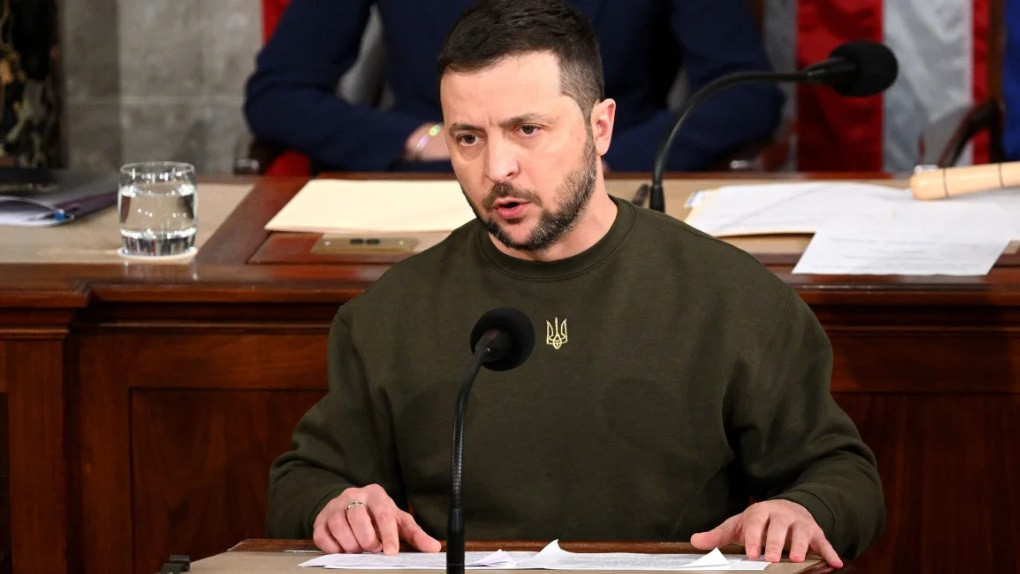The US will run out of funds to send weapons and support to Ukraine by the end of this year and that will affect the reality of the Ukrainian battlefield.

Ukrainian President Volodymyr Zelensky will address US senators via video on December 5 in a meeting, as the Biden administration calls on Congress to approve a nearly $106 billion funding proposal for the wars in Ukraine, Israel and other security needs.
Senate Majority Leader Chuck Schumer announced President Zelensky's appearance in the meeting a day after the US administration sent an urgent warning about the urgent need to approve military and economic assistance to Ukraine, stressing that Kiev's fight against Russia could stall without this aid.
Schumer said the administration has invited President Zelensky to address senators so they can hear directly from him exactly what threats Ukraine is facing. They will also hear from the secretaries of defense, state, and other top national security officials.
In a public letter to House and Senate leaders, Office of Management and Budget Director Shalanda Young warned that the US will run out of funding to send weapons and assistance to Ukraine by the end of the year, saying that would affect the realities of the Ukrainian battlefield.
She added that the US has run out of money to support the Ukrainian economy and in the event of a Ukrainian economic collapse, they will not be able to continue fighting and will be completely terminated.
US President Joe Biden is seeking a nearly $106 billion aid package for Ukraine, Israel and other security needs.
In the proposed new package, $61 billion would go to Ukraine, mostly for weapons purchases from the United States, and $14.3 billion to Israel, including $10.6 billion for weapons. There would also be nearly $14 billion for border security, along with aid to the Asia-Pacific region and other U.S. national security provisions.
But the process of passing the aid package on Capitol Hill has been far from smooth. Republicans are increasingly skeptical about the level of assistance to Ukraine, and even Republicans who support the funding are demanding changes to U.S.-Mexico border policy to stem the flow of migrants as a condition of the aid.
“Congress must decide whether to continue to support the war in Ukraine as part of the 50-nation coalition that President Biden has built, or whether Congress will ignore the lessons we have learned from history and let Russian President Vladimir Putin prevail. That is a clear choice, and we hope that Congress on a bipartisan basis will make the right choice,” National Security Adviser Jake Sullivan said on December 4.
Negotiations over a border security package collapsed over the weekend as Democrats refused to budge on Republican terms. Negotiations are expected to resume this week, with a vote expected on Dec. 6.
On December 4, Senate Republican leader Mitch McConnell said his party was still willing to negotiate.
To date, Congress has allocated $111 billion to support Ukraine, including $67 billion in military purchases, $27 billion in economic and civilian assistance, and $10 billion in humanitarian aid. Director Young noted that all but about 3 percent of the military funding was exhausted by mid-November. The Biden administration said it has slowed down military assistance to Kiev in recent weeks to try to stretch supplies until Congress approves more funding.
Meanwhile, the Republican-controlled House of Representatives passed a standalone aid package for Israel as it battles Hamas in Gaza. The White House has maintained that all priorities must be met.
Concerned about the death toll in the Israel-Hamas war, President Biden’s allies in Congress are pushing the administration to demand that Israel commit to reducing civilian casualties and allowing aid to Gaza before sending more military aid.
Senator Bernie Sanders said it would be irresponsible for the US to send billions of dollars in military aid to Israel's war without such conditions.
According to Tin Tuc Newspaper